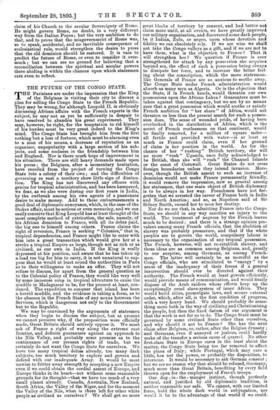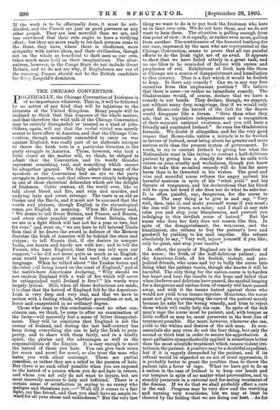THE FUTURE OF THE CONGO STATE. T HE Parisians are under
the impression that the King of the Belgians is visiting their city to discuss a plan for selling the Congo State to the French Republic. They may be wrong, for although Leopold II. is obviously discussing African affairs with the French experts in the subject, he may not as yet be sufficiently in despair to have resolved to abandon his great experiment. They may, however, be right, for the temptation to rid himself of his burden must be very great indeed to the King's mind. The Congo State has brought him from the first nothing but a loss of fortune, which must be alarming even to a man of his means, a decrease of reputation as an organiser, unpopularity with a large section of his sub- jects, and some coolness in the friendship between him and England. Nor is there much hope of improvement in his situation. There are still heavy demands made upon his purse ; the Belgians, after a momentary hesitation, have recoiled from the project of turning the Congo State into a colony of their own ; and the difficulties of governing so vast a territory show little sign of diminu- tion. The King has not discovered any officers with genius for tropical administration, and has been hampered, we fear, as we also were during our first years in India, by the outbreak among his own agents of a passionate desire to make money. Add to these embarrassments a good deal of diplomatic annoyance, which, in the case of the Stokes affair, must be serious or even menacing, and we can easily conceive that King Leopold has at least thought of the most complete method of extrication, the sale, namely, of his African dominion to France, with all its debts paid, the big one to himself among others. France claims the right of reversion, France is seeking " Colonies," that is, tropical dependencies, and France might like to enter with him into a great transaction which would give her at a stroke a tropical Empire as large, though not as rich or as civilised, as our own in India. If the King is really depressed at his position, and aware that he has taken up a load too big for him to carry, it is not unnatural to sup- pose that he would at least sound the authorities in Paris as to their willingness to make an offer. They will not refuse to discuss, for apart from the general question as to the Colonial policy of France, they would like very well by some immense coup in tropical adventure to cause the muddle in Madagascar to be, for the present at least, con- doned. The expedition to conquer that island has been a horrid muddle, and the evidence is taking a form, as to the absence in the French State of any nexus between the Services, which is dangerous not only to the Government but to the Republic. We may be convinced by the arguments of statesmen when they begin to discuss the subject, but at present we cannot perceive why, if the proposition were officially made, Great Britain should actively oppose it. We must ask of France a right of way along the extreme east frontier, and definite guarantees against an approach to the Nile Valley, and probably some promise as to the continuance of our present rights of trade, but we certainly do not want the Congo State for ourselves. We have too many tropical deltas already, too many dark subjects, too much territory to explore and govern and defend with our inadequate Army. It would be most unwise to fritter away strength by accepting a new Empire even if we could obtain the cordial assent of Europe, and Europe thinks in its heart—not without some reasonable grounds for its thought—that we have too much of a very small planet already. Canada, Australia, New Zealand, South Africa, the Valley of the Niger, and for the moment the Valley of the Nile, what is there left for other white people as civilised as ourselves ? We shall get no more great blocks of territory by consent, and had better not claim more until, at all events, we have greatly improved our military organisation, and discovered some dark people, be it Indian, Zulu, or negro, upon whose devotion and fidelity we can absolutely rely. If we are wise we shall not take the Congo valleys as a gift, and if we are not to have them, what is the objection to France ? That it will strengthen her ? We question if France is ever strengthened for attack by any possession she acquires beyond sea, the effect of such a possession being always to dissipate her force, and to increase the bitter feel- ing about the conscription, which the more statesman- like Generals of France are so anxious to soothe away. The Congo State under French administration would absorb as many men as Algeria. Or is the objection that the State, if in French hands, would threaten our own possessions upon the African Lakes ? Guarantees must be taken against that contingency, but we are by no means sure that a great possession which would soothe or satisfy French ambition for " her share " of Africa, would not threaten us less than the present search for such a posses- sion does. The sense of wounded pride, of having been overlooked in the distribution of Africa, which is the secret of French restlessness on that continent, would be finally removed, for a million of square miles— all fertile and provided with water—is at least as much as France could claim, even if her ground of claim is her position in the world. As for the chance of her " rushing" British territory, she will no more "rush" Uganda, once fully acknowledged to be British, than she will "rush" the Channel Islands or the coast of Cornwall. Great States do not cross foreign boundaries unless they intend invasion. More- over, though the British assent to such an increase of dominion would not make France permanently friendly, it would remove the impression, now so general among her statesmen, that one main object of British diplomacy is to be always in her way. Frenchmen have not for- gotten that we arrested the career of France both in India and North America; and so, as Napoleon said of Sir Sidney Smith, caused her to miss her destiny. Nor do we see that, in admitting France into the Congo State, we should in any way sanction an injury to the world. The treatment of negroes by the French leaves much to be desired ; and there is a strange opinion pre- valent among many French officials, that the abolition of slavery was probably premature, and that if the white peoples are to govern the world, compulsory labour is necessary to the organisation of any tropical possession. The French, however, will not re-establish slavery, and these ideas are as common among Belgians, and, greatly to our surprise, among Germans, as among French- men. The latter will certainly be as merciful as the Congo officials, who are stimulated to " energy " by a sense of the inadequacy of their forces if a general insurrection should ever be directed against their authority. The French would at least govern efficiently, would provide means of communication, and would finally dispose of the Arab raiders whose efforts keep up the exceptionally cruel slave-system of inner Africa. They would build cities, promulgate laws, and secure external order, which, after all, is the first condition of progress, with a very heavy hand. We should probably do some- thing more both in the way of civilising and Christianising the people, but then the fixed datum of our argument is that the work is not for us to do. The Congo State must be governed by some civilised State other than ourselves, and why should it not be France ? She has the next claim after Belgium, or, rather, after the Belgian dynasty ; and Germans, even if annoyed or jealous, could hardly make of the transfer a serious cause of quarrel. No other first-class State in Europe cares in the least about the matter, the Congo State being too far removed to affect the plans of Italy ; while Portugal, which may care a little, has not the power, or probably the disposition, to intervene. It would be necessary to ask German consent ; but we see no reason why that should be refused, Germany, much more than Great Britain, benefiting by every field thrown open for the employment of French troops. Our dog - in - the - manger instinct, though perfectly natural, and justified by old diplomatic tradition, is neither reasonable nor safe. We cannot, with our limited force, hold the whole dark world in subjugation, nor would it be to the advantage of that world if we could. If the work is to be effectually done, it must be sub- divided, and the French are just as good partners as any other people. They are less merciful than we are, and less convinced that their rule ought to have a vivifying effect ; but they are more ready to let dark persons come to the front, they have, where there is obedience, more sympathy with native ideas, and their civilisation, though not on the whole as beneficial to dark men as our own, takes much more hold on their imaginations. The alter- natives, however, in the Congo State do not include Great Britain, and we do not see why, if Englishmen are out of the running, France should not be the British candidate for King Leopold's dominion.







































 Previous page
Previous page